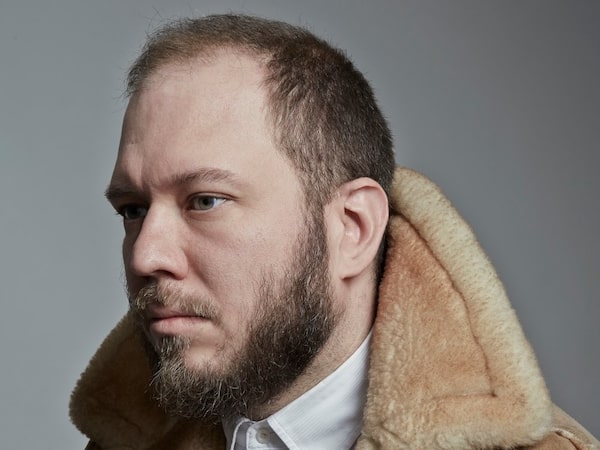
Alberta-born, Brooklyn-based Royce Vavrek often laces contemporary issues throughout his wide oeuvre.Ricardo Beas/Handout
Not many opera creators can claim both a farming background and a Pulitzer Prize. Royce Vavrek, who has written words for some of the most acclaimed works in contemporary opera, combines them with verve. The Alberta-born, Brooklyn-based librettist, playwright and filmmaker often laces contemporary issues throughout his wide oeuvre. Angel’s Bone (2016), written with Chinese composer Du Yun, explores human trafficking through the plight of two angels on Earth. The work won the 2017 Pulitzer Prize for Music.
Vavrek’s list of collaborators is a survey of modern opera composition: Grammy nominees David T. Little and Luna Pearl Woolf; Italian Paola Prestini; and Missy Mazzoli, with the latter being a close friend as well. Their Breaking the Waves (2016), an adaptation of the 1996 Lars von Trier film, received wide acclaim, as did one-act opera Songs From the Uproar (2012), exploring the life of Swiss trailblazer Isabelle Eberhardt and recently produced by City Opera Vancouver. The city held the Canadian premiere of Angel’s Bone in 2022, and the Toronto premiere is set to take place March 22-24 at Harbourfront Centre.
A co-production between Toronto-based Loose Tea Music Theatre, Array Music and Vancouver’s Sound the Alarm: Music/Theatre and Turning Point Ensemble, the cast includes tenor Asitha Tennekoon and soprano Winona Myles as the angels, and mezzo-soprano Alyssa Samson and baritone Alexander Dobson as the couple who exploit them.
Vavrek spoke to The Globe ahead of the premiere about the creation of Angel’s Bone, bringing newcomers to opera, and where opera and social issues meet.
How did you and Du Yun decide on the subject matter for Angel’s Bone?
We were both part of a now-disbanded New York City Opera vocal program years ago. She and I sat down over a few lunches – I said, “I’d like to do something involving angels,” and she said she’d love to do something about prostitutes, and I suggested we put the two things together. At the time Du had just visited Cambodia for the first time and had seen the devastating manifestation of trafficking there. We wanted to do something that felt international and not rooted in one culture. It became a parable, a fairy tale-type thing.
What responsibility do you feel as a contemporary opera creator?
If 1 per cent of the world sees opera then I hope before I die I can double that. I think there are people out there who would probably love what we do but just don’t even consider it. I also wonder why aren’t we busing in every student to see shows – I think we need to take them when they’re 14 on school trips, like schools used to. Make it regular. Every dress rehearsal should be full. There needs to be allowances for young people so they have access to this art form.
What role do you think contemporary opera can play in that engagement?
You can make the argument that Carmen has so many familiar songs, that for an opera newcomer there may be a familiarity they weren’t expecting. Having said that, my brother is a scientist – he works in the oil industry in Northern Alberta – and he has never seen an opera. His first one might be my and [composer] Ian Cusson’s Indians On Vacation at Edmonton Opera and currently in development. It’s a contemporary story about middle-aged Indigenous Albertans who go to Prague on vacation searching for family history. It’s a work in dialogue with the contemporary world even though it’s a grand opera. It’s on us to tell stories people want to see and leave a document of what making art was like in our time. Every opera I tell comes out of a need, and an opportunity.
You work with a lot of female composers; what is the creative connection?
I am a product of a lot of amazingly awesome women in my life. I’m close to my mother and I had this amazing childhood singing teacher too. Then I was taken under the wing of [indie opera impresario] Beth Morrison, whose influence has been transformative to the industry. There was never an intentionality of working with women, though I do feel it’s important to give voice to these historically marginalized voices. But initially I wanted to work with the very best composers – and I have.
Words or music: What comes first?
Always the words, although they do change. I do think one of the issues with opera these days is that a contemporary audience wants a more theatrical experience, and the theatre of the art form is in both the words and the music. The storytelling needs to be given more credence in order for a contemporary audience to find something they can latch onto. Part of my job as a librettist is to give the best words, so that together with the music everything is bigger than the sum of its parts.
Is that where social issues can play a role?
There is no artistic medium impervious to cultural shifts. Missy keeps saying opera is a wonderful place to bring awareness to contemporary social issues but that nobody’s minds will actually change. We do have predominantly liberal-minded audiences coming to these shows, so you’re preaching to the choir in some ways. I don’t know that Angel’s Bone is going to change minds but it might make you more aware. I do believe that opera and art can make you more compassionate – you walk a mile in another’s shoes, and that has real value.
This interview has been edited and condensed.